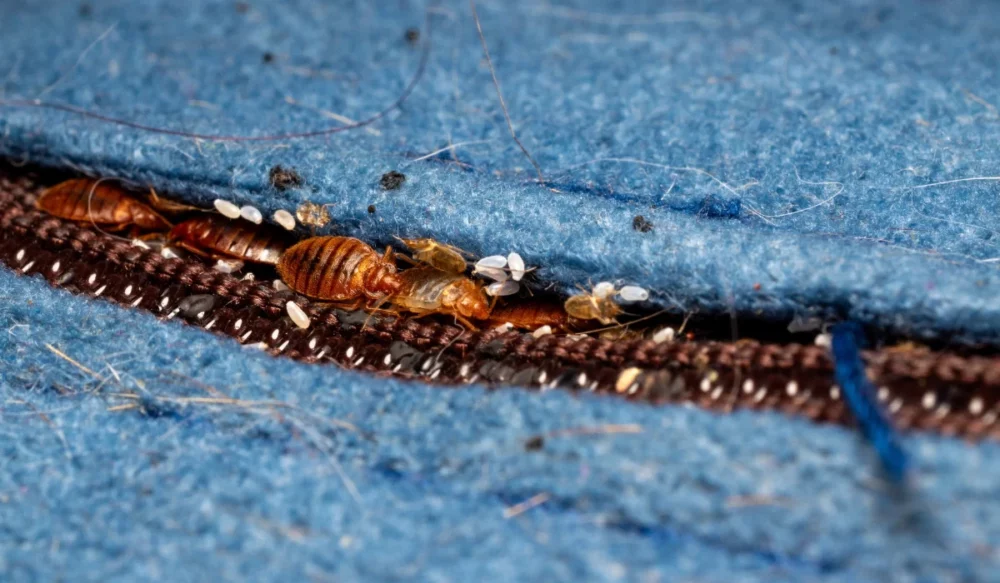When the Arizona heat ramps up, so does one unwelcome visitor: flies. For many Phoenix homeowners, the summer months mean more time indoors with air conditioning, and more time swatting at house flies, fruit flies, and gnats that seem to appear out of nowhere.
If you’ve noticed an uptick in flying pests lately, you’re not alone. Summer flies in Phoenix are a real and growing concern, especially with the combination of monsoon season, humidity, and an abundance of food sources both inside and out. These conditions make it easy for flies to breed, multiply, and invade your space.
Fortunately, there are proven steps you can take to prevent fly activity before it becomes a full-blown infestation.
Key Takeaways:
- Summer in Phoenix creates ideal conditions for fly infestations due to monsoon rains, high humidity, and lingering heat, which provide perfect breeding grounds and drive flies indoors.
- Common entry points include gaps in doors, windows, and vents, allowing house flies, fruit flies, gnats, and drain flies easy access to food and moisture sources inside your home.
- Effective prevention includes removing standing water, sealing entry points, and eliminating food attractants, while also using localized fly control products designed for Arizona’s environment.
- Professional pest control is recommended when DIY efforts don’t work, especially to address hidden breeding areas and prevent recurring infestations.
Why Summer Is Prime Time for Flies in Phoenix
Monsoon Season Creates the Perfect Breeding Ground
Arizona’s monsoon season typically begins in late June and continues through September. Sudden downpours followed by intense heat create lingering standing water, a key ingredient in the fly life cycle. From clogged gutters to neglected flower pots and pet bowls left outside, flies can easily find places to lay eggs
Within just a few days, fly larvae begin to develop in these damp areas. In addition to mosquitoes, fruit flies and gnats thrive in the excess moisture, quickly establishing breeding grounds around your property. More rain and humidity mean faster-growing fly populations.
Flies Seek Shelter From Extreme Heat
While the rest of the country may see cooler evenings in summer, Phoenix nights often remain in the 90s. These warm temperatures allow pests to stay active longer and continue feeding, mating, and expanding their territory well into the night.
For flies and other flying insects, that activity often includes finding ways inside your home. Cracks in door frames, open windows, or gaps around utility lines become easy entry points when flies are seeking a cooler, stable environment.
And once inside, your home offers everything they need: food, water, and shelter.
Indoor Environments Support Fly Populations
Once they enter your home, flies gravitate toward organic matter, leftover food scraps, sticky countertops, and uncovered trash. Even a small amount of decaying food or sugary residue can support a breeding cycle.
Overripe produce often brings fruit flies indoors. House flies are commonly attracted to trash cans, animal waste, and compost piles.
While some homeowners try DIY fly traps or sprays, these often only address adult flies, not the underlying conditions that keep them coming back.
The Most Common Summer Flies in Phoenix
Several common types of flies are common in the Phoenix area, especially during summer:
- House Flies: Known for spreading bacteria, they’re drawn to garbage, pet waste, and food residue.
- Fruit Flies: Tiny, fast-reproducing pests that are often found near fruit, wine, and fermented materials.
- Gnats: Frequently found near potted plants or in areas with poor drainage.
- Drain Flies: Thrive in kitchen or bathroom drains, where they feed on decaying organic buildup.
Each species has different preferences, but they all exploit the same opportunities: moisture, food, and access.
How Flies Are Entering Your Home
Homeowners are often surprised at how easily flies can get inside. Here are some of the most common entry points:
- Gaps under doors and around window frames
- Torn or missing window screens
- Unsealed attic or crawlspace vents
- Open garage doors or pet doors
- Gaps around plumbing, cables, and HVAC units
Because many of these pests are small and fast-moving, they can enter through even the tiniest cracks, making sealing and pest prevention essential.
The Risks of Fly Infestations
It’s easy to underestimate the health risks associated with flies. However, they’re more than just a nuisance.
Flies can transmit harmful bacteria and pathogens as they land on food, countertops, and utensils. Common illnesses linked to flies include:
- Salmonella
- E. coli
- Typhoid fever
- Cholera
The more flies present in your home, the greater the risk of contamination. Additionally, the presence of flies often signals a larger pest problem, as they may coexist with other invaders like cockroaches, crickets, or rodents, all attracted by similar food and water sources.
How to Prevent and Minimize Summer Fly Activity

The good news is that you can significantly reduce fly activity by following these prevention strategies:
1. Eliminate Standing Water
After every summer storm, inspect your property for areas where water may collect. This includes:
- Plant saucers
- Buckets and outdoor toys
- Clogged gutters
- Low points in your yard
- Pet bowls or bird baths
Empty or drain these sources regularly, and use sand or gravel to fill depressions in the soil. Reducing standing water not only limits flies but also helps manage mosquito control.
2. Seal Entry Points
Use a flashlight to inspect doors, windows, vents, and wall penetrations. Add or replace:
- Weatherstripping and door sweeps
- Window and vent screens
- Caulking around pipes and cables
For added protection, cover weep holes with fine mesh and check attic vents and chimneys for gaps.
3. Remove Food Sources
Keep your kitchen and pantry fly-resistant with these habits:
- Clean up food spills immediately
- Store fruit in the fridge
- Rinse recyclables before storing
- Keep trash bins closed tightly
- Wash dishes daily and clean drains regularly
Outdoors, collect fallen fruit, clean grills, and keep compost piles well-managed and away from your home’s foundation.
4. Limit Light and Odor Attractants
Flies are drawn to bright lights and certain smells. Reduce their allure with:
- Amber or motion-activated outdoor lighting
- Tight-sealed trash bins and compost covers
- Scent-neutral or unscented cleaning products
Consider avoiding sweet-smelling landscaping near entryways, especially during peak fly season.
5. Use Localized Fly Control Products
Many homeowners reach for off-the-shelf fly sprays that offer only temporary relief. Instead, use repellents and treatments formulated for the Phoenix area and its summer fly challenges.
Whether it’s fly bait, drain gel, or targeted perimeter treatments, look for options that align with your property and pest type.
Professional Help for Persistent Fly Problems
Despite best efforts, flies can persist due to hidden breeding grounds or repeat access points. If flies keep returning despite your efforts, it’s time to consider bringing in a licensed exterminator who understands Arizona’s unique ecosystem.
At Green Home Pest Control, we specialize in identifying the root causes of fly infestations and implementing sustainable solutions that work. Our pest control company services are designed for Phoenix homeowners and adapted to seasonal conditions, like monsoon season, high humidity, and urban landscaping.
We offer:
- Eco-friendly, family-safe treatments
- Local technicians who know Arizona pests
- A satisfaction guarantee on all services
- Preventive programs that protect year-round
Don’t Let Summer Flies Take Over
If you’re tired of dealing with buzzing pests in your kitchen, bathrooms, or backyard, you’re not alone. Flies are a health risk and a sign of broader pest control and exterminator concerns.
Get ahead of the issue now.
Green Home Pest Control is here to help protect your home from summer flies in Phoenix. Contact us today for a free quote and find out how easy it can be to maintain a cleaner, safer, fly-free home with the right pest control service.




